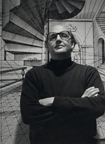 Architecture Professor Harry Mallgrave will be awarded an honorary fellowship from the Royal Institute of British Architects’ (RIBA) Council. The twelve fellowships announced on September 27 reward individuals from a diverse spectrum of backgrounds, including the worlds of education, sustainability, engineering, property development, journalism, politics and the wider built environment industry. The 2013 RIBA Honorary Fellowships will be awarded on Wednesday, February 6, 2013.
Architecture Professor Harry Mallgrave will be awarded an honorary fellowship from the Royal Institute of British Architects’ (RIBA) Council. The twelve fellowships announced on September 27 reward individuals from a diverse spectrum of backgrounds, including the worlds of education, sustainability, engineering, property development, journalism, politics and the wider built environment industry. The 2013 RIBA Honorary Fellowships will be awarded on Wednesday, February 6, 2013.
RIBA Honorary Fellowships are awarded annually to people who have made a particular contribution to architecture in its broadest sense. This includes its promotion, administration and outreach; and its role in building more sustainable communities and in the education of future generations.
Harry Francis Mallgrave is an architect, scholar, editor, and professor of history and theory at Illinois Institute of Technology. After several years in architectural practice, he took his doctoral studies at the University of Pennsylvania in 1983 under the supervision of Stanford Anderson. His dissertation topic -The Idea of Style: Gottfried Semper in London -presaged his focus on German theory in his early career. This phase of his work culminated in the intellectual biography Gottfried Semper: Architect of the Nineteenth Century, which won the prestigious Alice Davis Hitchcock Award from the American Society of Architectural Historians.
He has written numerous books and articles on the history and theory of architecture including: Modern Architectural Theory: A Historical Survey, 1673-1968, and An Introduction to Architectural Theory: 1968 to the Present. In recent years Mallgrave’s interests have broadened, as indicated by his book The Architect’s Brain: Neuroscience, Creativity, and Architecture. He has more recently followed up on this study with Architecture and Embodiment: The Implications of the New Sciences and Humanities for Design, to be published in 2013. It appeals to the emotional process of embodied simulation, rejects overly conceptualized approaches to theory and the objectification of design (viewing buildings as objects), and argues for a return to the focus of design to where it formerly resided -the human experience of inhabiting the world.
